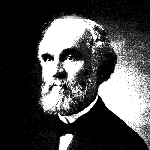
Winslow Upton
Born and raised in Salem, Massachusetts, Winslow Upton went to highschool with other eminent astronomers such as Frank Very (who also signed the Van Vleck Observatory guestbook on Dedication Day) and Albert Flint. Unlike Very, Upton did not actually sign the Van Vleck Observatory guestbook himself: unfortunately he passed away a couple of years before the Dedication. His wife and daughter, however, were present at the top of Observatory Hill on June 16, 1916; Cornelia Augusta Babcock signed in her late husband’s name. While not much is known of Cornelia, Winslow had a varied and vibrant career in astronomy that is worth noting here.
After graduating high school at the age of 16, Upton actually studied music in Boston for several years before enrolling in Brown University, where he would become class valedictorian. He continued his studies in astronomy at the University of Cincinnati before becoming a staff member at the Harvard College Observatory in 1878. It was at Harvard that Upton and his colleagues would become forever immortalized in the original parody musical “The Observatory Pinafore.”
A rewrite of Gilbert and Sullivan’s “H.M.S. Pinafore; or The Lass That Loved a Sailor” (a wildly popular comedic opera at the time), The Observatory Pinafore does not in fact take place on a boat but rather in the Computing Room of the Harvard College Observatory (Act I) and the Library of the Harvard College Observatory (Act II). While the play is most-often attributed to Upton, the manuscript is actually in the handwriting of Williamina Fleming (as explained by Harlow Shapley to Upton’s daughter Eleanor in this letter). Curiously enough, the play wasn’t performed in its entirety until 50 years after its conception, years after Upton’s death, on New Year’s Eve at the 1929 American Astronomical Association meeting by a group of prominent astronomers. Shapley, who played one of the female computers, wrote to Eleanor after the festivities, “I have had many letters from astronomers concerning our meetings, and especially the New Year's Eve party. They seem to agree that we attained the zenith of foolishness and merriment.” A snippet of the play is at the end of this article, but you can read the whole play here.
After his time at Harvard, Upton spent a year as an engineer for the U.S. Lake Survey and then another year as a computer for the U.S. Naval Observatory, followed by two years as a computer and assistant professor of meteorology for the U.S. Signal Service. In 1883 he settled on the job he would hold for the rest of his life: Professor of Astronomy at Brown University. According to the Encyclopedia Brunonia, the university’s encyclopedia for all things Brown, Upton accepted his position on the condition that the university would soon have an observatory; he was assured one was in the making. The astronomer was about to leave Brown when a few years later no construction was truly underway, but a generous donation from Rhode Island Governor Herbert Ladd gave the project a jump-start. From that point on, Professor Upton was involved in all aspects of the observatory design and planning; Frederick Slocum, the first director of the Van Vleck Observatory, and a former graduate student of Upton’s, wrote in the Popular Science article memorializing his mentor’s death, “At the time of its dedication in 1891, the Ladd Observatory was considered one of the finest observatories for teaching purposes in the country.” Much of the credit here can be directly attributed to Upton.
The professor would take several leaves of absences in his career to embark on eclipse expeditions all over the globe, from Virginia, USA to inland Russia. He also spent significant time researching in Germany, England, Peru, and Chile. He was the first dean of Brown University but only held this position for one year (in 1900). Never one to give up his love for music, Upton fell ill after directing a Christmas musical performance with his church choir and died of pneumonia shortly after. We’ll let Slocum have the final say on Upton: “His enthusiasm for beloved science was contagious and his influence as a man of the highest ideals, of sound common sense, of genial and kindly spirit will long be felt by all who were in any way associated with him.”
And, as promised, here is a snippet from the musical “The Observatory Pinafore.” In the script, Winslow Upton invites everyone to sing, and all actors break out with:
An astronomer is a sorry soul,
As free as a caged bird;
His sympathetic ear should be always quick to hear
The directorial word.
He must open the dome and turn the wheel
And watch the stars with untiring zeal.
He must toil at night though cold it be
And he never should expect a decent salaree.
Chorus:
He must open the dome and turn the wheel
And watch the stars with untiring zeal.
He must toil at night though cold it be
And he never should expect a decent salaree.
His eyes should shine with learned fire,
His brow with thought be furrowed;
His energetic speech should be ever prompt to teach
The truths which he has borrowed.
His knees should bend and his neck should curl
His back should twist and his face should scowl,
One eye should squint and the other protrude,
And this should be his customary attitude.
Chorus:
His knees should bend and his neck should curl
His back should twist and his face should scowl,
One eye should squint and the other protrude,
And this should be his customary attitude.”
One more time!
For further reference:
http://www.brown.edu/Administration/News_Bureau/Databases/Encyclopedia/search.php?serial=U0050
http://adsabs.harvard.edu/full/1914PA.....22..208S
http://hea-www.harvard.edu/~jcm/html/shapley.html
http://hea-www.harvard.edu/~jcm/html/play.html
The Facts
OccupationProfessor of Astronomy
Date & Place of BirthOctober 21, 1853 in Salem, Massachusetts
Date & Place of DeathJanuary 8, 1914 at Providence, Rhode Island
Alma MaterBrown University (A.B., Honorary Sc.D) University of Cincinatti (A.M.)
Observatory AffiliationHarvard College Observatory (1877-9) Ladd Observatory (1891-time of death)
Date of Wesleyan VisitJune 16, 1916 (age 62 at time of visit)